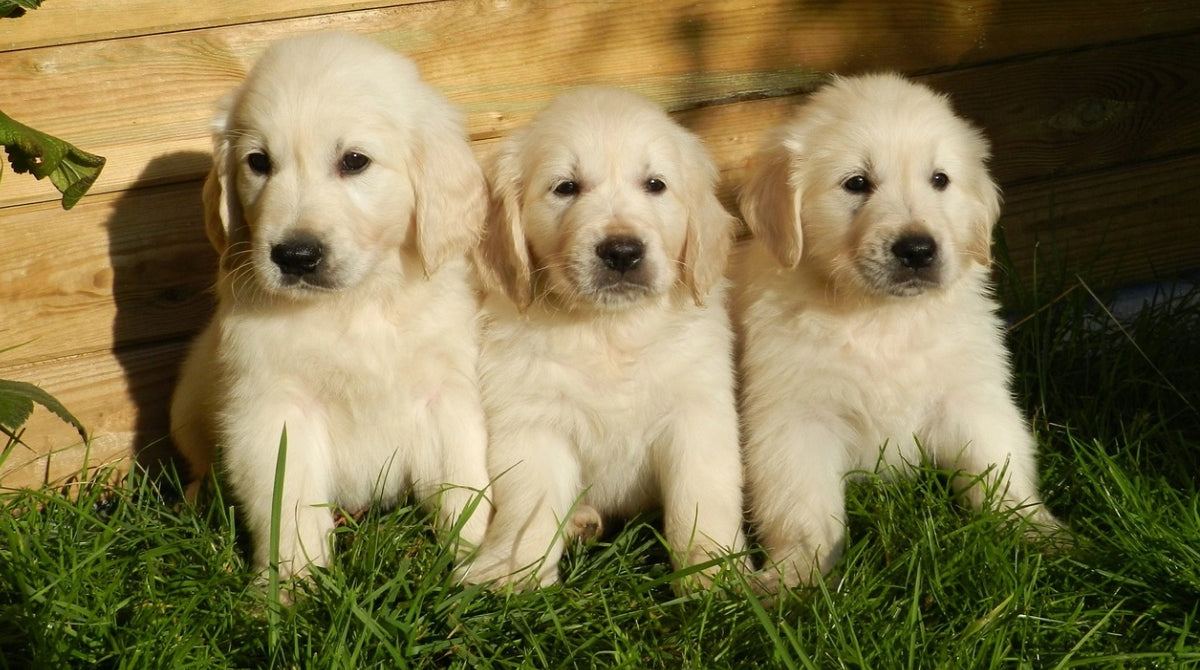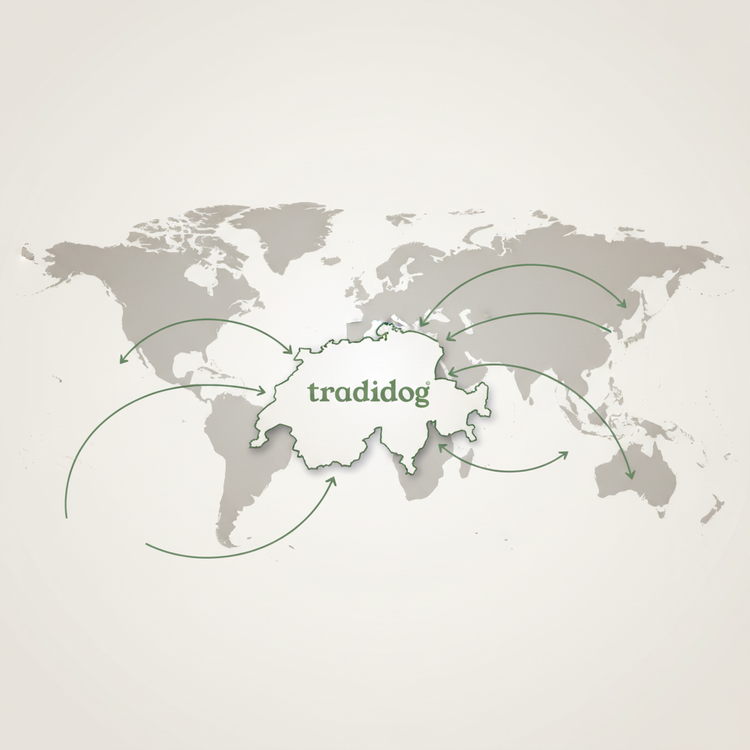
Everything about puppies
Puppies are arguably the sweetest thing the pet world has to offer: With their big eyes, clumsy paws, and boundless curiosity, they capture hearts. But as adorable as these little furballs are, keeping them comes with a lot of responsibility. From the right food and initial training steps to care and socialization—there are a lot to consider to ensure a successful start to life together and that your puppy develops into a healthy, happy companion. In this blog post, you'll learn (almost) everything about puppies so you can give your new family member the best possible start.
Before purchasing
There are many different questions to ask before purchasing a dog. This can often be overwhelming. In our series: Dogs for Beginners, we try to prepare you as best as possible for the purchase. Feel free to stop by.
Which dog breed is best suited to me and my lifestyle?
Choosing a dog breed should be based on your lifestyle. If you're athletic and active, breeds like Labradors or Border Collies might be a good fit. If you have a more relaxed lifestyle, a Pug or Basset Hound might be ideal. Also consider whether you have enough time and space to meet the breed's needs.
How do I recognize a reputable breeder?
A reputable breeder is transparent and will let you visit the mother dog and puppies. They will show you health certificates and ask many questions about your living situation to ensure their puppy goes to good homes.
Should I get a puppy from a shelter or a breeder?
Both options have advantages. There are many dogs waiting at the shelter looking for a loving home, often mixed breeds. A breeder, on the other hand, offers you the opportunity to choose a specific breed with clear characteristics. Consider which one suits you better and make a responsible decision.
How much does it cost to keep a puppy?
You should expect costs for food, vet visits, vaccinations, toys, grooming supplies, and liability insurance. In the first year, expenses can range from CHF 1,000 to CHF 2,500 or more.
Health and Care
When should my puppy go to the vet for the first time?
You should take your puppy to the veterinarian within the first few weeks of adopting it. There, he will be examined, vaccinated, and dewormed.
Which vaccinations does my puppy need and when?
Your puppy needs vaccinations against distemper, parvovirus, leptospirosis, hepatitis, and rabies. The vaccination schedule usually begins at 8 weeks of age. Your veterinarian will provide you with a detailed schedule.
How often should I bathe or groom my puppy?
You should only bathe your puppy when necessary, for example, if he's very dirty. Regular brushing is usually enough to keep his coat clean.
What do I do if my puppy has diarrhea or vomits?
Mild diarrhea can be caused by stress or a change in diet. Offer your puppy a bland diet and make sure he drinks plenty of fluids. If symptoms persist or your puppy vomits, you should consult your veterinarian.
How do I know if my puppy is in pain?
Puppies often show pain through changes in behavior such as restlessness, whining, avoiding certain movements, or refusing to eat. Watch for signs of your puppy licking or protecting certain areas of his body, and consult your veterinarian if you suspect pain.
Which parasites can infect my puppy and how can I prevent them?
Common parasites include fleas, ticks, and worms. You can prevent them with regular deworming and spot-on treatments or special collars. You should check your puppy for ticks after walks.
When and how often should my puppy be dewormed?
Puppies should be dewormed every two weeks starting at two weeks of age until they are 12 weeks old. Thereafter, deworming is recommended every three months or as directed by your veterinarian.
Does health insurance make sense for my puppy?
Yes, unforeseen veterinary expenses can arise, especially during the first few years of life. Health insurance helps cover high treatment costs, especially in the case of accidents or chronic illnesses.
How can I prevent dental problems in my puppy?
Get your puppy used to brushing their teeth early with special dog toothpaste. Chews and special puppy food also help keep their teeth clean.
What do I do if my puppy is limping or injured?
First, observe him to see if the limping goes away on its own. If it persists for more than a day or if he appears to be in severe pain, you should consult a veterinarian.
Which care products are suitable for puppies?
Use gentle grooming products specifically designed for puppies, such as puppy shampoo, a soft brush, and paw balm. Make sure the products don't contain any irritants.
How do I know if my puppy is allergic to something?
Allergies often manifest as skin problems, itching, or gastrointestinal upset. If you notice these symptoms, consult your veterinarian for possible allergy testing.
Education and behavior
How do I housetrain my puppy?
Take your puppy outside regularly after sleeping, eating, and playing. Praise him lavishly when he goes to the toilet. With patience and consistency, he will quickly learn to be housebroken.
What should I do if my puppy constantly bites my hands or furniture?
Puppies explore the world with their mouths. Give them an appropriate toy when they bite, and consistently say "no" or "out." This will help them learn what's allowed and what's not.
How do I get my puppy used to a leash?
First, let him get used to a collar or harness. Start with short training sessions indoors and reward calm behavior. Gradually, he'll walk confidently on a leash.
When should I start training and which commands are important first?
You can start training as early as week 8. Basic commands like "sit," "down," and "here" are good starting exercises. Make sure to keep the training sessions short and positive.
How does my puppy learn to be alone without developing fear?
Train your puppy to be alone gradually. Start by leaving the room for only a short time and gradually increase the duration. Reward calm behavior and give your puppy a toy or blanket to provide security.
How do I stop my puppy from barking constantly?
Find out why your puppy is barking (e.g., boredom, fear, excitement). Distract him with training or play, and reward him when he stays calm. Avoid inadvertently rewarding him for barking by giving him attention.
What should I do if my puppy is afraid of other dogs?
Deal with fear with patience. Let him observe other dogs from a safe distance and reward relaxed behavior. Gradually, you can reduce the distance without forcing him.
How do I teach my puppy not to pull on the leash?
Stop as soon as your puppy pulls on the leash and only continue the walk when the leash is slack. Reward him when he stays beside you. With patience, he'll learn that pulling doesn't get him anywhere.
How do I correct unwanted behavior without frightening my puppy?
Use clear, calm commands like "No" or "Stop" and immediately redirect your puppy toward a desired behavior. Positive reinforcement through praise and treats is key to encouraging good behavior.
When and how does my puppy learn to follow certain rules in the house?
Introduce rules from the beginning and be consistent. For example, decide where your dog can sleep or whether he can sit on the sofa. Praise him when he follows the rules and correct undesirable behavior immediately.
How do I foster a bond with my puppy through training?
Use plenty of praise, rewards, and physical proximity during training. Shared games and positive experiences will strengthen your bond.
A lot of material to process today. To keep you interested in reading, here's a photo of a cute puppy:

Nutrition
A quick advertisement for our own benefit (we have to earn our money somehow, right?! ;-)) On the Tradidog website, you can find out everything about the best supplements for dogs and purchase them directly from our online shop. Your dog will thank you.
What is the best food for my puppy?
Choose a high-quality puppy food that meets the nutritional needs of a growing dog. Your veterinarian can provide recommendations that are appropriate for your dog.
How often and how much should I feed my puppy?
Puppies should be fed 3-4 times a day. The exact amount depends on age, weight, and breed. Refer to the instructions on the food packaging and adjust as needed.
Can my puppy eat human food?
Many foods that are safe for us can be harmful to dogs, such as chocolate, onions, or spicy foods. It's better to stick to special dog food.
Which treats are suitable for training?
Use small, healthy treats that your puppy can chew quickly. This way, you don't interrupt training and can reward him immediately.
socialization
When can my puppy meet other dogs or animals?
After the initial vaccination (usually starting at 12 weeks), it's safe to introduce your puppy to other dogs or other animals. Choose well-socialized dogs initially to encourage positive experiences.
How do I get my puppy used to new people and environments?
Introduce your puppy to new situations slowly. Positive experiences and rewards will help him quickly get used to unfamiliar people and places.
At what age should I take my puppy to dog training school?
Many dog schools offer puppy classes starting at 8 to 12 weeks. There, your dog will learn important social skills and basic behavioral rules.
What should I do if my puppy is afraid of new situations?
Stay calm and give your puppy time to adjust to the new situation. Avoid pushing him and reward brave behavior.
Everyday life and care
How much sleep does my puppy need?
A puppy sleeps up to 18-20 hours a day. Sleep is important for his development and recovery. Make sure he has a quiet place to sleep.
How long can my puppy be left alone?
Puppies should initially only be left alone for short periods (1-2 hours). Being alone should be trained slowly and gradually so that your puppy doesn't develop separation anxiety.
How do I keep my puppy busy without overwhelming him?
Alternate short play and exercise sessions with rest periods. Brain games and simple training stimulate his mind without overtaxing him.
What should I do if my puppy cries at night?
Place the basket near you so he feels safe. Gradually, you can get him used to his own sleeping space.
How do I structure my puppy's daily routine sensibly?
A regular daily routine with set feeding and walking times will give your puppy security. Plan sufficient rest periods, playtime, and short training sessions.
How much exercise does my puppy need daily?
Puppies need age-appropriate exercise. A general rule of thumb is 5 minutes of walking per month of age (e.g., 15 minutes for a 3-month-old puppy). Avoid overexertion.
Can I take my puppy to the office, and what should I keep in mind?
Yes, if your workplace is dog-friendly. Provide a quiet space, toys, and water. Gradually introduce your puppy to the new environment and make sure he's not stressed.
How do I react if my puppy gets nervous during car rides?
Start with short rides and reward relaxed behavior. A secure crate or special dog car seat can provide additional support and security.
What do I need to consider when going on vacation with my puppy?
Check whether your destination is dog-friendly and what entry requirements apply to dogs. Pack everything you need, such as vaccination records, food, and a first-aid kit. Plan regular breaks.
How do I find a good dog daycare or sitter for my puppy?
Visit the facility or meet the caregiver beforehand. Make sure the environment is clean and your puppy is well cared for. Get recommendations and reviews.
What are the most important things I should take with me when walking my puppy?
A leash, collar or harness, poop bags, water, a small bowl, and a few treats. Depending on the length of the walk, toys or a blanket may also be useful.
Development
When does my puppy change his baby teeth?
Teething usually begins at 16 weeks and is completed by 6 months. During this time, you can offer your baby chew toys to relieve pressure on his gums.
How do I know if my puppy is growing healthily?
A healthy puppy is active, has a shiny coat, and clear eyes. Regular vet visits help monitor its development.
When will my puppy be fully grown?
Small dogs are often fully grown at 10-12 months, larger breeds need up to 18-24 months.
How does my puppy's behavior change over time?
Your puppy will go through phases of exhibiting new behaviors, especially during puberty. Patience and consistent training are especially important during this time.
How much weight should my puppy gain in the first few months?
Growth varies by breed. Small breeds gain weight more slowly, while large breeds gain a lot of weight in the first year. Your veterinarian can help you monitor growth.
What physical changes are normal during puberty?
Your puppy may become more restless or rebellious. Physically, their coat changes, and in some breeds, their ears and paws grow faster than the rest of their body.
How does my puppy's sleeping behavior change over time?
In the first few months, your puppy will sleep up to 20 hours a day. As he gets older, his sleep periods will become shorter and he will become more active.
When should I have my puppy spayed or neutered?
The right timing depends on the breed and individual factors. Talk to your veterinarian to make the best decision.
How can I encourage my puppy's mental development?
Brain games, new environments, and varied training stimulate his mind. Toys that encourage thinking, such as food mazes, are ideal.
When should my puppy start walking up stairs?
Climbing stairs can put strain on the joints, especially in large breeds. Wait until your puppy is at least 6 months old and allow only a few steps at first.
How long does it take for my puppy's final coat color to show?
In some breeds, coat color continues to change into adulthood. This can take up to two years, depending on genetics and breed.
Legal questions
Is there a leash requirement for puppies?
The leash requirement depends on where you live. Find out about the regulations in your canton or municipality. You can find out more about this important topic in this blog post about the leash requirement in Switzerland.
Does my puppy need liability insurance?
Yes, liability insurance is a good idea. You are responsible for any damage your dog causes.
What laws and regulations do I have to follow as a puppy owner?
Depending on the canton, there are regulations regarding leash requirements, registration, and muzzle requirements. Check with your local authority to be on the safe side.
Conclusion
Puppies represent a wonderful new beginning full of joy, but also responsibility. Their care and training require knowledge, patience, and consistency. From preventative health care to proper nutrition and socialization, there are many aspects to consider. With careful preparation and loving care, you can give your puppy the best possible start in life. This way, they will not only grow up healthy and happy, but will also develop into a loyal companion who will enrich your life.
Tradidog motto: Buying a puppy doesn't require courage, but you should still do your research beforehand!
And because they are so cute, here is another photo of puppies to finish.

Share

